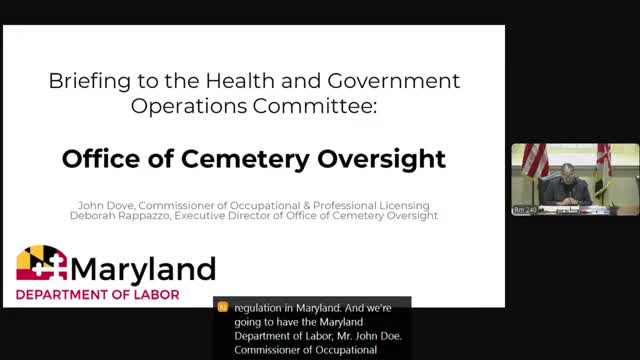Maryland panel details response to Heaven Bound crematory and flags gaps in oversight and inspections
Get AI-powered insights, summaries, and transcripts
Subscribe
Summary
The Health and Government Operations Committee heard detailed briefings on state oversight of crematories and the response to problems at Heaven Bound Crematory, including a public‑health abatement order, the removal of decedents and a suspension of the crematory’s permit.
The Health and Government Operations Committee heard detailed briefings on state oversight of crematories and the response to problems at Heaven Bound Crematory, including a public-health abatement order, the removal of decedents and a suspension of the crematory’s permit.
Maryland Deputy Secretary for Public Health Services Nilesh Kalyanaraman said state and local health officials first learned of problems at Heaven Bound on Jan. 10 and “we plan to issue an order of abatement. And we did serve that the next day, and we gave them 72 hours to comply with this.” He told the committee investigators later found decedents not properly stored, sanitation issues and a broken retort (furnace), and that the State Anatomy Board ultimately removed decedents and sheltered them while families were contacted.
The matter drew attention because oversight is split: 42 of the state’s 47 regulated crematories are overseen by the Maryland Board of Morticians and Funeral Directors (under Maryland Department of Health) and five are regulated by the Office of Cemetery Oversight (OCO) at the Maryland Department of Labor. OCO Commissioner John Dove told the committee the OCO has a very small staff, with two vacant positions, licenses 21 crematory operators under its oversight and inspected all five facilities it regulates this past year with “no significant findings.”
Why it matters: panelists and lawmakers said the case exposed both an urgent public-health risk for families and workers and long‑standing operational limits in licensing and inspection capacity. If regulators lack staff or clear lines of responsibility, members warned, problems at individual facilities can persist and compound.
MDH response and State Anatomy Board actions
Kalyanaraman described a sequence of actions: the Charles County Health Department was notified after a Board of Morticians inspection; the local health officer and state staff concluded improperly managed remains and biohazardous materials created an imminent public-health risk; an abatement order was issued with a 72‑hour compliance window; investigators found 25 decedents on site and later identified 18 remaining decedents; the department issued subpoenas for records; the Board of Morticians summarily suspended the crematory permit and the crematory operators; and the State Anatomy Board removed the decedents to its facility to contact next of kin and arrange disposition. Kalyanaraman said the State Anatomy Board “had these decedents, and were reaching out to the next of kin, to process their death certificates, and to, once again, offer cremation services, for free, if that's what the family has decided, or transfer the decedents to a funeral home or a crematory of the family's choosing.”
Office of Cemetery Oversight and enforcement powers
John Dove of the Maryland Department of Labor described OCO’s complaint and enforcement process and the agency’s limited staff. He said OCO handles complaints by logging intake, investigating when warranted, performing on‑site inspections and then making a closing disposition; potential sanctions include hearings, cease‑and‑desist orders, license denial, reprimand, suspension or revocation, and monetary fines (up to $5,000 per violation and $500 per day), and in rare situations OCO may seek emergency revocation or a court restraining order. Dove said OCO had not received consumer complaints about crematories in the recent period covered but handles cemetery and burial business complaints and that the agency’s statute and regulations are in Title 5 of the Business Regulation Article of the Maryland Annotated Code.
Board of Morticians, staffing and inspections
Erica Malone, executive director of the State Board of Morticians and Funeral Directors, told the committee the board is authorized for six staff positions but had four filled at the time of her remarks and only one statewide inspector/investigator. Malone said the board oversees 274 licensed establishments, including 36 crematories and 37 mortuary transport services. Malone said the board came into the current administration with an inspection backlog of roughly 300 establishments and had completed about 132 inspections in the past year after staffing changes.
Andrew Liberto, the board’s sole inspector and investigator, said he has resumed inspections after a period with very limited on‑site work, and described recent practice: “I have been going out, daily, inspecting about 3 to 6 establishments a day.” He told the committee one inspector is insufficient for statewide oversight and said some establishments had gone years without inspection; the board said routine inspection frequency is every two years for regulated crematories.
Committee concerns and next steps
Lawmakers repeatedly asked whether the split oversight—some crematories regulated by the Board of Morticians, some by OCO—creates regulatory gaps. Board and OCO officials said the split is based on ownership and statutory definitions (for example, if a majority interest is owned by a mortician the facility typically falls under the board) and acknowledged that communications and staffing need improvement. Malone told the committee the board is pursuing an operational audit and a fee regulation to help fund additional staffing; she said the board has submitted budget and organizational requests and is seeking another investigator PIN (position).
Committee chair Jocelyn Pena Melnick closed the discussion by asking board and department staff to meet with committee counsel and legislative leaders to explore legislative fixes and budget options to shore up inspections and enforcement.
Ending
Committee members said they will follow up with the board, the Maryland Department of Health and the Department of Labor to track implementation of any staffing changes, regulatory clarifications and interagency procedures intended to reduce the risk of future incidents and better protect families and public health.
